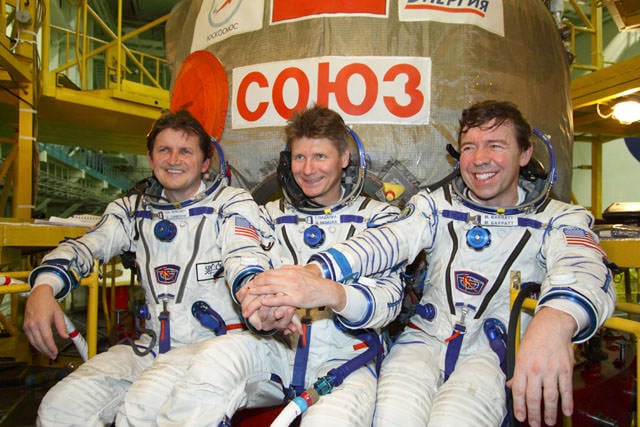[/caption] A Russian cosmonaut spoke out last week before boarding the Soyuz and heading to the International Space Station, saying that while astronauts and cosmonauts have no problems getting along on board the ISS, the bureaucracies on the ground may still be experiencing a bit of cold war bickering. Gennady Padalka told the Novaya Gazeta newspaper that officials from Russia, the United States and other countries require cosmonauts and astronauts to eat their own food and follow stringent rules on access to other facilities, like toilets. "What is going on has an adverse effect on our work," said Padalka, now on board the ISS, who will be taking over command of the space station for Expedition 19 and 20. Padalka, American astronaut Michael Barratt and spaceflight participant Chalres Simonyi reached the ISS on Saturday. "Cosmonauts are above the ongoing squabble, no matter what officials decide. We are grown-up, well-educated and good-mannered people and can use our own brains to create normal relationship. It's politicians and bureaucrats who can't reach agreement, not us, cosmonauts and astronauts."
Padalka, a veteran of two previous missions to the ISS said the squabbles are hurting the crew's morale and complicating work in space.
Russian space agency spokesman Alexander Vorobyov didn't have an immediate comment to Padalka's views.
Padalka said the arguments began back in 2003, when Russia started charging other space agencies for the resources used by their astronauts. Other partners in space station responded by requiring similar rules.
[caption id="attachment_28157" align="aligncenter" width="330" caption="Padalka on the ISS: Sharing food is good in space. Credit: NASA"]
[/caption] While sharing food in the past helped the crew feel like a team, new rules require the Russian cosmonauts and U.S. and other astronauts to eat their own food, Padalka said. Also, he said he asked before the current mission whether he could use an American exercise equipment to help stay in shape in the microgravity environment in space.
"They told me: 'Yes, you can.' Then they said no," he was quoted as saying. "Then they hold consultations and they approve it again. And now, right before the flight, it turns out again that the answer is negative."
"They also recommend us to only use national toilets," Padalka was quoted as saying.
Padalka was also quoted as criticizing the Russian portion of the station, saying it looks backward compared to other sections.
"It's built on technologies dating back to the mid-1980s, at the very latest," he said. according to the report. "We are lagging seven to 30 years back in various space technologies."
Russia's space program has been known to be in financial troubles, and they have been selling seat on its Soyuz spacecraft to bring space tourists to the space station. However, with the increase in crew size on the ISS from three to six, every every spare seat on the Soyuz are spoken for, with no room for any additional tourists in the coming years.
Credit: Yahoo News
 Universe Today
Universe Today
